Unit30 A giant squid Lesson60 课件(共35张PPT)
文档属性
| 名称 | Unit30 A giant squid Lesson60 课件(共35张PPT) |

|
|
| 格式 | pptx | ||
| 文件大小 | 16.2MB | ||
| 资源类型 | 试卷 | ||
| 版本资源 | 新概念英语 | ||
| 科目 | 英语 | ||
| 更新时间 | 2024-09-09 00:00:00 | ||
图片预览


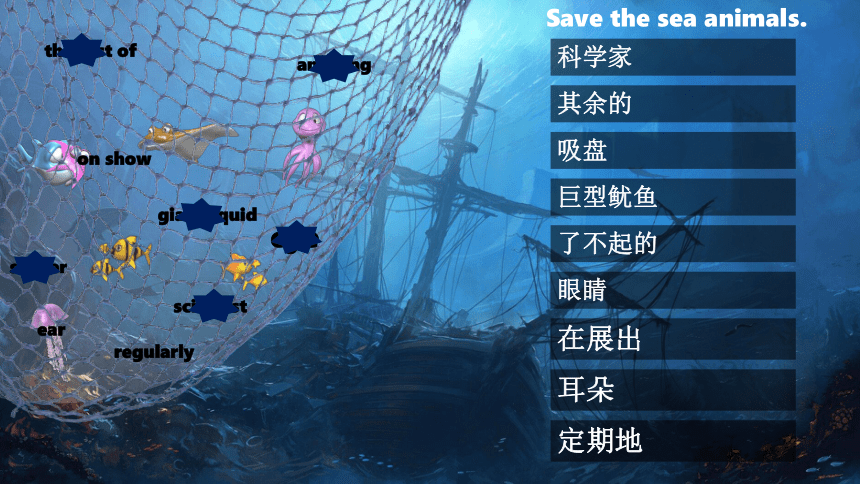
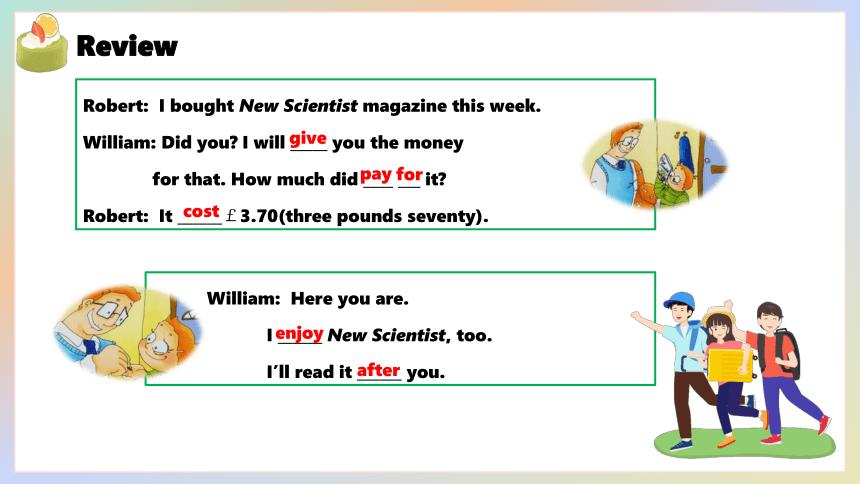




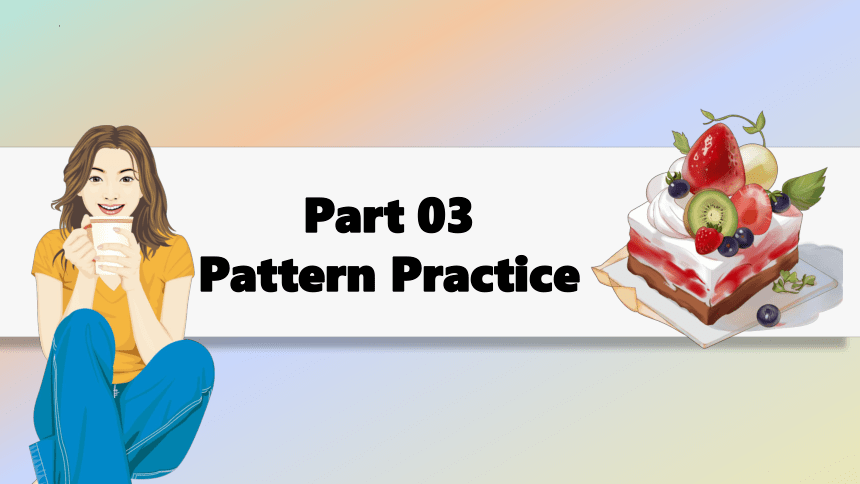
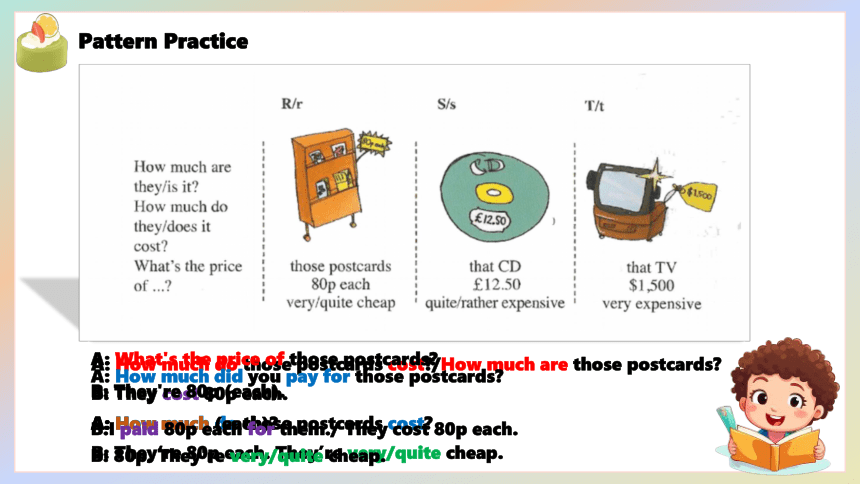
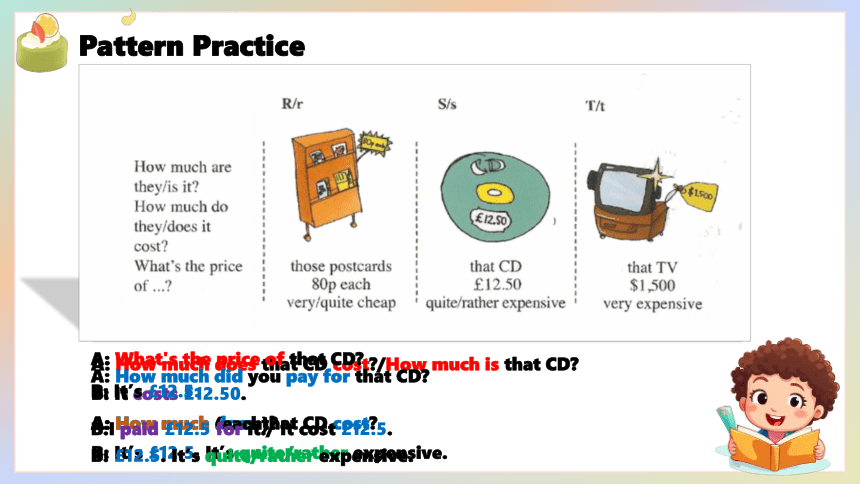

文档简介
(共35张PPT)
Unit 30 Lesson 60
A giant squid
Part 01 Review
regularly
scientist
on show
科学家
Save the sea animals.
the rest of
其余的
sucker
吸盘
ear
amazing
了不起的
giant squid
巨型鱿鱼
eye
眼睛
定期地
耳朵
在展出
Review
Robert: I bought New Scientist magazine this week.
William: Did you I will _____ you the money
for that. How much did ____ ___ it
Robert: It ______£3.70(three pounds seventy).
William: Here you are.
I ______ New Scientist, too.
I’ll read it ______ you.
give
pay
for
cost
enjoy
after
Robert: That’s __ _________ in it __________ a giant squid.
It’s _____ ________ at the Natural History
Museum.
Robert: It’s 9 _________ __________.
William: Nine metres…that’s about 30____________ .
That’s ___ _________ ___ a London bus.
a piece
about
on show
metes long
feet
as long as
Review
Robert: I know. It’s eyes are ___ ____ ___ plates.
and its suckers are ____ ________ ______ a man’s leg.
William: That’s _____________.
Robert: Can we ____ _______ _______ it, Dad
William: Yes, of course .
We’ll go ___ Sunday morning. The ____
of the family will be at the athletics.
as
big
as
as
big
as
amazing
go
and
see
on
rest
Review
Part 02
New Words
New Words
postcard /'p stkɑ d/ n.明信片
squid /skw d/ n.鱿鱼
weigh /we / v.重量有……
Part 03
Pattern Practice
Pattern Practice
A: How much do those postcards cost /How much are those postcards
B: They cost 80p each.
A: How much do those postcards cost
B: They‘re 80p each. They’re very/quite cheap.
A: What's the price of those postcards
B: They're 80p (each).
A: How much (each)
B: 80p. They're very/quite cheap.
A: How much did you pay for those postcards
B:I paid 80p each for them./ They cost 80p each.
Pattern Practice
A: How much does that CD cost /How much is that CD
B: It costs 12.50.
A: How much does that CD cost
B: It’s 12.5. It’s quite/rather expensive.
A: What's the price of that CD
B: It’s 12.5.
A: How much (each)
B: 12.5. It’s quite/rather expensive.
A: How much did you pay for that CD
B:I paid 12.5 for it./ It cost 12.5.
Pattern Practice
A: How much does that man weigh /What’s his weight
B: He’s 62kilos. He’s very thin.
Pattern Practice
A: How much does the parcel weigh /What’s the weight of the parcel
B: It’s half a kilo. It’s quite light.
Part 04
Grammars
Grammars
询问价格:
How much + be +物
How much is your schoolbag
How much do/does +物+cost
How much does your schoolbag cost
How much did+人+ pay for+物
How much did you pay for your schoolbag
回答方式为:
主语+be +钱数.
They are five pounds. 它们花了五英镑。
主语+cost(s)+钱数.
It costs twenty yuan. 它花了二十元。
What‘s the price of +物
Whats the price of your schoolbag
Grammars
询问重量:
How much do/ does +主语+weigh
How much do you weigh 你有多重
What + be + one's weight
What is her weight 她有多重
What + be + the weight of +主语
What‘s the weight of the parcel 这个包裹有多重
回答方式为:
主语+be+重量。
They are six kilos. 它们重六公斤。
主语+weigh(s)+重量。
It weighs twenty pounds. 它重二十镑。
小贴士:
pound既能作价格单位也能作重量单位,都有单复数的变化。
人民币的单位yuan,没有单复数的变化,不能说two yuans.
Grammars
cost的用法
cost作动词用时,意思是“值……钱;价值为,花费”.
以物或事做主语,不能以人作主语,也不能用于被动语态.
I like this dress, but it costs too much.
我喜欢这件裙子,但是它太贵了。
This pencil-box cost me ten yuan.
这个铅笔盒花了我十元钱。
pay的用法
pay作动词时,意思是“付款”或“支付”,多以人为主语.
The patient paid 500 pounds for the operation.
病人为手术支付了500英镑。
pay sb for 表示为……向某人付款。
I paid the salesman fifty yuan for the book.
我买书给了售货员50元。
pay for... 表示为……付款。
Grammars
spend 的用法
spend只能作动词用,意思是花费(钱、时间),度(时光、假期),多以人为主语。
l spent my holiday in London last summer.
She spent a lot of money on clothes.
【注】 spend ... on sth = spend ...(in) doing sth
我去年夏天在伦敦度过的假期。
她在衣服上花了很多的钱。
take的用法
take作动词时意思是花(某人)时间夫做……,多用it作形式主语。
lt takes him two hours to do his homework every day.
【注]lt takes sb some time to do sth该句型只能表达“花费时间”而不能用于“花费金钱”.
他每天花费两个小时做功课.
Grammars
on后面加日期星期,具体的某一天的上午下午晚上,以及on后面加地点的用法.
on show 展出
on holiday 度假
on sale 出售
on business 因公出差
The house is on sale. 房屋出售。
He is on business these days. 这些天他正出差。
介词on的其他用法
也有这样一些用法,on后面加名词表示短暂的、短时间的状态.
100RMB
100GBP
100RUB
100USD
100
100
100 p
100$
Grammars
圈出正确的单词或短语
1.- (How much / How many) are the vegetables
-Twenty yuan.
2.(What / What's) the price of those magazines
3.How much did you pay (of / for) the train ticket
4.- What is the (price / weight) of that man
- 65 kilos. He's too thin.
5.How much (does / is) the painting cost
选择正确答案
1.l bought a new sofa yesterday and it ______ me 200 yuan.
A. costs B. cost C. paid
2.- _________ the price of the shoes
- They are 200 yuan.
A. How many B. What’s C.How much
3.- What's the _________ of that suitcase
- 2 kilos.
A.price B. weigh C. weight
B
B
C
Part 05
Pronunciation
Pronunciation
Word stress
fan 'tastic
compe 'tition
natio'nality
'chemistry
1.以元音+辅音/爆破辅音群+-y结尾(-gy,-phy,-ry,-ty,-stry)的单词,倒数第三个音节重读. bi'ology ge'ography history natio'nality 'chemistry
2.以-ic,-ics,和-ion或者-ian结尾的单词,倒数第二个音节重读.
fan'tastic ath'letic(s) Mathe'matics, compe'tition repu'tation。
Part 07 Practice
Practice
1.How much ...(you/ pay / it) (pic. 1)
2.There's ... (piece / giant squid)(pic.3)
3.Its eyes ... (big / plates / suckers / big / man's leg)(pic. 5)
4.The rest ... (family / be / athletics)(pic.6)
How much did you pay for it
There's a piece in it about a giant squid.
Its eyes are as big as plates,and its suckers are as big as a man's leg.
The rest of the family will be at the athletics.
Practice
1.Which magazine did Robert buy this week
2.How much did it cost Does William give him the money for it or not
Does he enjoy themagazine, too (Use ..., and and ..., because)
3.Is there a piece in it about a small squid or a giant squid
Where is the squid on show (Use ..., and)
4.How long is it How big are its eyes How big are its suckers (Use ..., and)
5.Who wants to go and see it Can they go on Sunday morning or Sunday afternoon
Where will therest of the family be (Use ..., and and ..., because)
Robert bought New Scientist this week.
It cost £3.70, and William gives him the money for it because he enjoys the magazine, too.
There is a piece in it about a giant squid, and the squid is on show at the Natural History Museum.
It is 9 metres long, its eyes are as big as plates, and its suckers are as big as a man’s leg.
Robert wants to go and see it, and they can go on Sunday morning, because the rest of the family will be at the athletics.
Robert bought New Scientist this week. It cost £3.70, and William gives him the money for it because he enjoys the magazine, too. There is a piece in it about a giant squid, and the squid is on show at the Natural History Museum. It is 9 metres long, its eyes are as big as plates, and its suckers are as big as a man’s leg. Robert wants to go and see it, and they can go on Sunday morning, because the rest of the family will be at the athletics.
Practice
Practice
1.Did you buy a magazine this week or last week
2.What was the name of the magazine How much did it cost
3.Do you buy it every week, or only sometimes
4.Was there an interesting piece in this week's/last week's magazine What was it about
5.Were there any drawings or photographs with it
6.What can you remember about the piece
Last week I bought a good magazine.
It was Computer World, and it cost 2.50.
I only buy it sometimes.
There was an interesting piece in last week's magazine about a new Leena Lang game.
There were some photographs with it
I can remember one of them - a photo of her as a martial arts master.
Practice
Last week I bought a good magazine. It was Computer World, and it cost 2.50. I enjoy it, but I don't buy it every week, because it is expensive: I only buy it sometimes. There was an interesting piece in last week's magazine about a new Leena Lang game. (I've already got two Leena Lang games.)There were some photographs with it, and I can remember one of them - a photo of her as a martial arts master.
Practice
1 hen did the study begin
2 How old were the children then
3 Do fatter children always eat more than thinner children
4 Did the fattest children get thinner later
5 Thin children and fat children behave differerntly, don’t they What is the difference
Twenty-five years ago.
Five years old.
No, they don’t.
No, they didn’t.
Yes, they do. Thin children don’t watch television at weekends, and fat children do .
点击图片进入超链接
There was a piece in New Scientist last week. Twenty-five years ago, scientist looked at the weight of 11,000 children. That study showed something strange. Fatter children did not always eat more than thinner children. Funnily enough, some fat children ate less than thinner children.
Last year, the scientists looked at the same group of people, and they discovered something interesting. First, the fattest five-year-old then were the fattest thirty-year-olds now.Second, fatter children watched television at weekends, and thinner children did not. Third, the fattest children in the study watched more than 4 hours of television every weekend. Their parents did the same.
Just 4 hours! I didn’t watch television as a child, and I don’t watch television now. But I sit at my computer for hours and hours! And I’m getting fat! OK, I get the picture.
Practice
点击返回图标进入超链接
A Questions
1 Your suitcase is heavy! How much does it weigh
2 Does she play tennis well
3 Where did you come in the race
4 How much do you weigh now
5 Is your car very reliable
6 How far is it from your house to the college
B Answers
1 Well, it’s more reliable than my old one.
2 Yes, she plays better than I do.
3 Oh, about 2 miles.
4 I came last.
5 I don’t know – about 20 kilos, I think.
6 I only weigh about 60 kilos.
Practice
1.How much did you ____ it
A.buy B. pay C. cost D. pay for
2.I enjoy New Scientist, too. ____ it after you.
A. I read B. I’m reading C. I’ll read D.I’m going to read
3.It’s on show at ____ Natural History Museum.
A. / B. a C. the D. an
4.Nine meters…that’s about 30 feet.That’s ____ a London bus.
A. long B. as long C. as long as D. long than
5.It’s suckers are as big as ____leg!
A.man B. a man C.men’s D. a man’s
Practice
D
C
C
C
D
Thank you!
Unit 30 Lesson 60
A giant squid
Part 01 Review
regularly
scientist
on show
科学家
Save the sea animals.
the rest of
其余的
sucker
吸盘
ear
amazing
了不起的
giant squid
巨型鱿鱼
eye
眼睛
定期地
耳朵
在展出
Review
Robert: I bought New Scientist magazine this week.
William: Did you I will _____ you the money
for that. How much did ____ ___ it
Robert: It ______£3.70(three pounds seventy).
William: Here you are.
I ______ New Scientist, too.
I’ll read it ______ you.
give
pay
for
cost
enjoy
after
Robert: That’s __ _________ in it __________ a giant squid.
It’s _____ ________ at the Natural History
Museum.
Robert: It’s 9 _________ __________.
William: Nine metres…that’s about 30____________ .
That’s ___ _________ ___ a London bus.
a piece
about
on show
metes long
feet
as long as
Review
Robert: I know. It’s eyes are ___ ____ ___ plates.
and its suckers are ____ ________ ______ a man’s leg.
William: That’s _____________.
Robert: Can we ____ _______ _______ it, Dad
William: Yes, of course .
We’ll go ___ Sunday morning. The ____
of the family will be at the athletics.
as
big
as
as
big
as
amazing
go
and
see
on
rest
Review
Part 02
New Words
New Words
postcard /'p stkɑ d/ n.明信片
squid /skw d/ n.鱿鱼
weigh /we / v.重量有……
Part 03
Pattern Practice
Pattern Practice
A: How much do those postcards cost /How much are those postcards
B: They cost 80p each.
A: How much do those postcards cost
B: They‘re 80p each. They’re very/quite cheap.
A: What's the price of those postcards
B: They're 80p (each).
A: How much (each)
B: 80p. They're very/quite cheap.
A: How much did you pay for those postcards
B:I paid 80p each for them./ They cost 80p each.
Pattern Practice
A: How much does that CD cost /How much is that CD
B: It costs 12.50.
A: How much does that CD cost
B: It’s 12.5. It’s quite/rather expensive.
A: What's the price of that CD
B: It’s 12.5.
A: How much (each)
B: 12.5. It’s quite/rather expensive.
A: How much did you pay for that CD
B:I paid 12.5 for it./ It cost 12.5.
Pattern Practice
A: How much does that man weigh /What’s his weight
B: He’s 62kilos. He’s very thin.
Pattern Practice
A: How much does the parcel weigh /What’s the weight of the parcel
B: It’s half a kilo. It’s quite light.
Part 04
Grammars
Grammars
询问价格:
How much + be +物
How much is your schoolbag
How much do/does +物+cost
How much does your schoolbag cost
How much did+人+ pay for+物
How much did you pay for your schoolbag
回答方式为:
主语+be +钱数.
They are five pounds. 它们花了五英镑。
主语+cost(s)+钱数.
It costs twenty yuan. 它花了二十元。
What‘s the price of +物
Whats the price of your schoolbag
Grammars
询问重量:
How much do/ does +主语+weigh
How much do you weigh 你有多重
What + be + one's weight
What is her weight 她有多重
What + be + the weight of +主语
What‘s the weight of the parcel 这个包裹有多重
回答方式为:
主语+be+重量。
They are six kilos. 它们重六公斤。
主语+weigh(s)+重量。
It weighs twenty pounds. 它重二十镑。
小贴士:
pound既能作价格单位也能作重量单位,都有单复数的变化。
人民币的单位yuan,没有单复数的变化,不能说two yuans.
Grammars
cost的用法
cost作动词用时,意思是“值……钱;价值为,花费”.
以物或事做主语,不能以人作主语,也不能用于被动语态.
I like this dress, but it costs too much.
我喜欢这件裙子,但是它太贵了。
This pencil-box cost me ten yuan.
这个铅笔盒花了我十元钱。
pay的用法
pay作动词时,意思是“付款”或“支付”,多以人为主语.
The patient paid 500 pounds for the operation.
病人为手术支付了500英镑。
pay sb for 表示为……向某人付款。
I paid the salesman fifty yuan for the book.
我买书给了售货员50元。
pay for... 表示为……付款。
Grammars
spend 的用法
spend只能作动词用,意思是花费(钱、时间),度(时光、假期),多以人为主语。
l spent my holiday in London last summer.
She spent a lot of money on clothes.
【注】 spend ... on sth = spend ...(in) doing sth
我去年夏天在伦敦度过的假期。
她在衣服上花了很多的钱。
take的用法
take作动词时意思是花(某人)时间夫做……,多用it作形式主语。
lt takes him two hours to do his homework every day.
【注]lt takes sb some time to do sth该句型只能表达“花费时间”而不能用于“花费金钱”.
他每天花费两个小时做功课.
Grammars
on后面加日期星期,具体的某一天的上午下午晚上,以及on后面加地点的用法.
on show 展出
on holiday 度假
on sale 出售
on business 因公出差
The house is on sale. 房屋出售。
He is on business these days. 这些天他正出差。
介词on的其他用法
也有这样一些用法,on后面加名词表示短暂的、短时间的状态.
100RMB
100GBP
100RUB
100USD
100
100
100 p
100$
Grammars
圈出正确的单词或短语
1.- (How much / How many) are the vegetables
-Twenty yuan.
2.(What / What's) the price of those magazines
3.How much did you pay (of / for) the train ticket
4.- What is the (price / weight) of that man
- 65 kilos. He's too thin.
5.How much (does / is) the painting cost
选择正确答案
1.l bought a new sofa yesterday and it ______ me 200 yuan.
A. costs B. cost C. paid
2.- _________ the price of the shoes
- They are 200 yuan.
A. How many B. What’s C.How much
3.- What's the _________ of that suitcase
- 2 kilos.
A.price B. weigh C. weight
B
B
C
Part 05
Pronunciation
Pronunciation
Word stress
fan 'tastic
compe 'tition
natio'nality
'chemistry
1.以元音+辅音/爆破辅音群+-y结尾(-gy,-phy,-ry,-ty,-stry)的单词,倒数第三个音节重读. bi'ology ge'ography history natio'nality 'chemistry
2.以-ic,-ics,和-ion或者-ian结尾的单词,倒数第二个音节重读.
fan'tastic ath'letic(s) Mathe'matics, compe'tition repu'tation。
Part 07 Practice
Practice
1.How much ...(you/ pay / it) (pic. 1)
2.There's ... (piece / giant squid)(pic.3)
3.Its eyes ... (big / plates / suckers / big / man's leg)(pic. 5)
4.The rest ... (family / be / athletics)(pic.6)
How much did you pay for it
There's a piece in it about a giant squid.
Its eyes are as big as plates,and its suckers are as big as a man's leg.
The rest of the family will be at the athletics.
Practice
1.Which magazine did Robert buy this week
2.How much did it cost Does William give him the money for it or not
Does he enjoy themagazine, too (Use ..., and and ..., because)
3.Is there a piece in it about a small squid or a giant squid
Where is the squid on show (Use ..., and)
4.How long is it How big are its eyes How big are its suckers (Use ..., and)
5.Who wants to go and see it Can they go on Sunday morning or Sunday afternoon
Where will therest of the family be (Use ..., and and ..., because)
Robert bought New Scientist this week.
It cost £3.70, and William gives him the money for it because he enjoys the magazine, too.
There is a piece in it about a giant squid, and the squid is on show at the Natural History Museum.
It is 9 metres long, its eyes are as big as plates, and its suckers are as big as a man’s leg.
Robert wants to go and see it, and they can go on Sunday morning, because the rest of the family will be at the athletics.
Robert bought New Scientist this week. It cost £3.70, and William gives him the money for it because he enjoys the magazine, too. There is a piece in it about a giant squid, and the squid is on show at the Natural History Museum. It is 9 metres long, its eyes are as big as plates, and its suckers are as big as a man’s leg. Robert wants to go and see it, and they can go on Sunday morning, because the rest of the family will be at the athletics.
Practice
Practice
1.Did you buy a magazine this week or last week
2.What was the name of the magazine How much did it cost
3.Do you buy it every week, or only sometimes
4.Was there an interesting piece in this week's/last week's magazine What was it about
5.Were there any drawings or photographs with it
6.What can you remember about the piece
Last week I bought a good magazine.
It was Computer World, and it cost 2.50.
I only buy it sometimes.
There was an interesting piece in last week's magazine about a new Leena Lang game.
There were some photographs with it
I can remember one of them - a photo of her as a martial arts master.
Practice
Last week I bought a good magazine. It was Computer World, and it cost 2.50. I enjoy it, but I don't buy it every week, because it is expensive: I only buy it sometimes. There was an interesting piece in last week's magazine about a new Leena Lang game. (I've already got two Leena Lang games.)There were some photographs with it, and I can remember one of them - a photo of her as a martial arts master.
Practice
1 hen did the study begin
2 How old were the children then
3 Do fatter children always eat more than thinner children
4 Did the fattest children get thinner later
5 Thin children and fat children behave differerntly, don’t they What is the difference
Twenty-five years ago.
Five years old.
No, they don’t.
No, they didn’t.
Yes, they do. Thin children don’t watch television at weekends, and fat children do .
点击图片进入超链接
There was a piece in New Scientist last week. Twenty-five years ago, scientist looked at the weight of 11,000 children. That study showed something strange. Fatter children did not always eat more than thinner children. Funnily enough, some fat children ate less than thinner children.
Last year, the scientists looked at the same group of people, and they discovered something interesting. First, the fattest five-year-old then were the fattest thirty-year-olds now.Second, fatter children watched television at weekends, and thinner children did not. Third, the fattest children in the study watched more than 4 hours of television every weekend. Their parents did the same.
Just 4 hours! I didn’t watch television as a child, and I don’t watch television now. But I sit at my computer for hours and hours! And I’m getting fat! OK, I get the picture.
Practice
点击返回图标进入超链接
A Questions
1 Your suitcase is heavy! How much does it weigh
2 Does she play tennis well
3 Where did you come in the race
4 How much do you weigh now
5 Is your car very reliable
6 How far is it from your house to the college
B Answers
1 Well, it’s more reliable than my old one.
2 Yes, she plays better than I do.
3 Oh, about 2 miles.
4 I came last.
5 I don’t know – about 20 kilos, I think.
6 I only weigh about 60 kilos.
Practice
1.How much did you ____ it
A.buy B. pay C. cost D. pay for
2.I enjoy New Scientist, too. ____ it after you.
A. I read B. I’m reading C. I’ll read D.I’m going to read
3.It’s on show at ____ Natural History Museum.
A. / B. a C. the D. an
4.Nine meters…that’s about 30 feet.That’s ____ a London bus.
A. long B. as long C. as long as D. long than
5.It’s suckers are as big as ____leg!
A.man B. a man C.men’s D. a man’s
Practice
D
C
C
C
D
Thank you!
同课章节目录
- Unit 16 What's your middle name?
- Unit 17 A cuckooin the nest
- Unit 18 Read the label!
- Unit 19 Aproblem with squirrels
- Unit 20 An ordinery life
- Unit 21 The weather forecast
- Unit 22 I always behave myself!
- Unit 23 Quite tall...and quite steiking!
- Unit 24 A quiz
- Unit 25 Karen saves some money
- Unit 26 School reports
- Unit 27 Pocket money
- Unit 28 She doesn't even exist!
- Unit 29 No one's better than Paul!
- Unit 30 A giant squid
